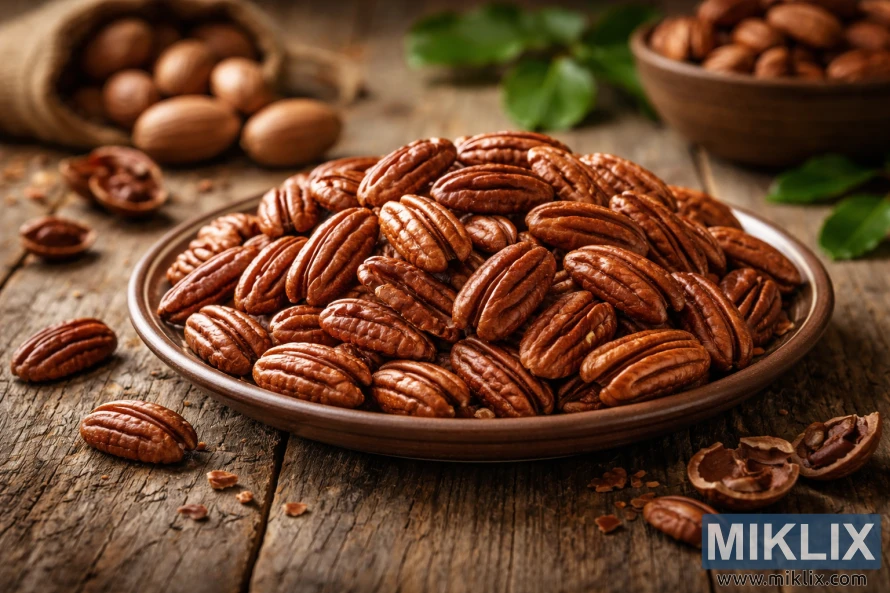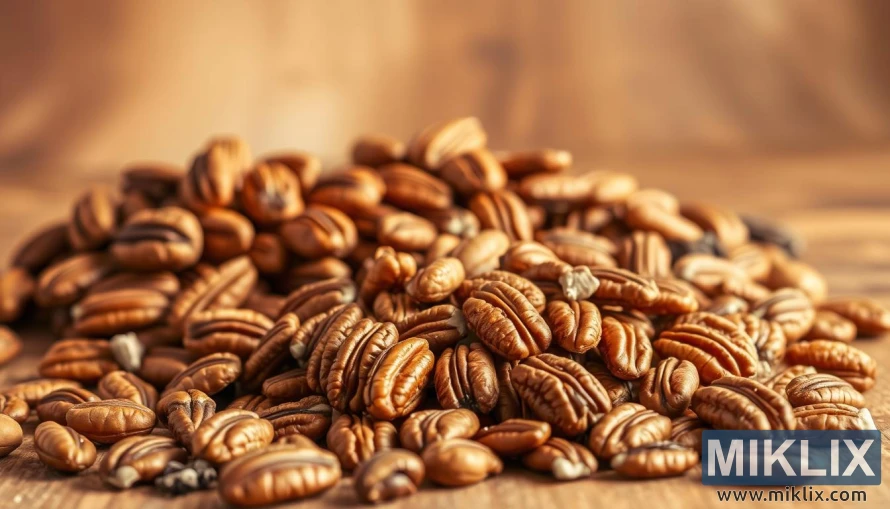Beyond Pie: The Nutritional Power of Pecans You Didn’t Know
Published: May 22, 2025 at 8:37:40 AM UTC
Last updated: December 23, 2025 at 11:00:00 AM UTC
Pecan nuts are not just tasty; they're also full of health benefits. They come from North America, growing well in northern Mexico and the southern United States. These nuts are rich in healthy fats, vitamins, and minerals. In this article, we'll look at the amazing health perks of pecan nuts. We'll explore their nutritional value and how they help with heart health, diabetes, and more.

Key Takeaways
- Pecan nuts offer a wealth of health benefits due to their rich nutritional profile.
- These nuts are high in monounsaturated fats, which support heart health.
- Pecans can assist in diabetes management by stabilizing blood sugar levels.
- They possess anti-inflammatory properties that may benefit overall health.
- Including pecan nuts in your diet can aid in weight management.
- Always consult a healthcare provider before making significant dietary changes.
What Are Pecan Nuts?
Pecan nuts are unique because they're the only major tree nut from North America. They have a rich history tied to Native Americans. These nuts were a key food source and were loved for their delicious taste.
When American settlers moved west, they brought pecan trees to places like New Mexico. The climate there is perfect for these trees to grow.
Pecan trees belong to the hickory family. They produce nuts that are loved for their taste in many dishes. Pecans have a buttery flavor that works well in both sweet and savory foods.
They can be enjoyed in different ways, like raw, roasted, or chopped. This makes them a favorite in many recipes.
Nutritional Profile of Pecan Nuts
Pecan nuts are not just tasty; they're also good for you. A serving of 19 halves has about 196 calories. They have 20.4 grams of fat, mostly the good kind that's good for your heart.
These nuts are full of important vitamins like:
- Vitamin A
- Vitamin E
- B-complex vitamins
They also have key minerals such as:
- Calcium
- Magnesium
- Zinc
Pecans are also rich in dietary fiber. This makes you feel full without eating too many carbs. Plus, they have no cholesterol or sodium, making them a great snack choice.
Heart Health Benefits of Pecan Nuts
Pecan nuts are great for your heart. They are full of monounsaturated fats, which are good for you. These fats help lower bad cholesterol, or LDL, which is a major heart disease risk.
Eating pecans can also lower your LDL cholesterol levels when you haven't eaten for a while. This is good for your heart health.
Pecans also have potassium and magnesium. These minerals help control blood pressure. Lower blood pressure means less risk of heart disease and stroke.

Diabetes Management with Pecan Nuts
Pecan nuts are a tasty choice for those with diabetes. They have a low glycemic index, making them a great snack for keeping blood sugar stable. Adding pecans to your diet can help control glucose levels, which is key for managing carbs.
Research shows that eating pecans can lower fasting glucose and hemoglobin A1c levels. The healthy fats and fiber in pecans are great for managing blood sugar. Including pecans in your meals can help balance out the effects of higher glycemic foods.
Introducing pecans into your diet can improve taste and help manage diabetes better. Try them in salads, oatmeal, or as a quick snack. This way, you can enjoy their benefits fully.
Anti-Inflammatory Properties of Pecan Nuts
Pecan nuts are not just tasty snacks; they also have amazing anti-inflammatory benefits. They are full of omega-3 fats, which help reduce body inflammation. This is great for people with arthritis, as it can ease joint pain and discomfort.
Pecans also have antioxidants that boost their anti-inflammatory powers. They contain magnesium, fiber, vitamin E, and zinc. These nutrients help fight inflammation. Adding pecans to your meals is a natural way to manage inflammation and enjoy a delicious snack.
Pecan Nuts and Bone Health
Pecan nuts are more than just a tasty snack; they offer significant benefits for bone health. The minerals found in these nuts, like calcium and magnesium, play vital roles in maintaining a strong skeletal structure. A diet rich in pecans can help strengthen bones and muscles, preventing conditions like osteoporosis.
Calcium is key for bone density, and magnesium helps regulate calcium levels in the body. Adding pecans to your diet is a tasty way to boost your intake of these minerals. Regularly eating pecans can improve bone health, leading to better overall well-being.

Antioxidant Properties of Pecan Nuts
Pecan nuts are packed with antioxidants, making them great for your health. They have lots of vitamin E and flavonoids. These help protect cells from damage caused by oxidative stress.
Oxidative stress can harm cells and lead to diseases. Pecans are among the top nuts for fighting this stress. Eating pecans can help prevent serious diseases like cancer and heart problems. They help keep your body strong against free radicals.
Pecan Nuts and Weight Management
Pecan nuts are great for weight management because of their nutritional value. They are high in calories but also in healthy fats and fiber. These nutrients help you feel full, making them a good snack for weight control.
Studies show that eating nuts regularly can lead to a lower body mass index. Adding pecans to your meals helps you enjoy their taste while keeping your diet balanced. This way, you can eat well without worrying about gaining weight.
Adding pecans to your snacks can help control hunger. They prevent you from eating too much at main meals. With their tasty flavor and crunchy texture, pecans can become a key part of your weight management plan.
Adding Pecan Nuts to Your Diet
Adding pecan nuts to your diet can make your meals tastier and healthier. These nuts are great in many ways, making them a wonderful addition to your cooking. Try spreading pecan butter on your toast for a nutritious start to the day. It's not just healthy fats, but also a unique taste.
Adding pecans to salads is another great idea. They add a nice crunch and a rich flavor. Salads can be light or hearty, and pecans are perfect for both.
Baking with pecans can lead to many tasty recipes. Add chopped pecans to cookies, muffins, or bread. It boosts nutrition and adds a nice nutty smell to your baked goods.
These easy tips make adding pecans to your diet simple and fun. Try out different recipes that feature pecans. Enjoy the tasty health benefits they bring to your meals.
Potential Allergies to Pecan Nuts
Pecan nuts are tasty and good for you, but they can cause problems for people with nut allergies. This allergy can show up in different ways. It might cause mild symptoms like itching and hives, or it could lead to serious reactions like anaphylaxis.
People with a nut allergy should stay away from pecans. There's also a risk of cross-contamination, which is when pecans mix with other nuts in processing. So, it's key to check labels for allergen warnings to stay safe.
If you're adding pecans to your meals, be careful. Knowing the difference between nut allergies helps you make better food choices. Always talk to a doctor if you have any worries about food allergies.
Portion Sizes for Pecan Nuts
The right serving size for pecan nuts is about one ounce. This is roughly 19 halves. It lets people enjoy their health benefits while watching their calorie intake. Pecan nuts are packed with vitamins and minerals but are also high in calories.
To snack healthily, add pecans to your diet in moderation. Mixing different nuts into your meals can help you feel full. But, it's key to keep an eye on how much you eat. Eating too much can lead to too many calories, which might not help your health goals.
To snack on pecans the right way, portion them out in small containers or bags. This makes snacking easy and helps you stick to a healthy amount. It also builds a habit of moderation that's good for your overall health.
Storage Tips for Pecan Nuts
To keep pecan nuts fresh, it's important to store them right. They should be in a cool, dry spot, out of sunlight. This keeps their taste and health benefits intact. For longer storage, put them in the fridge. The cold helps stop them from getting rancid, which is key because of their fat content.
Freezing pecans is also a good way to store them for a long time. If you put them in an airtight container or freezer bag, they can stay good for months. This way, you can enjoy their health perks whenever you want.
- Store in a cool, dry environment.
- Refrigerate for extended freshness.
- Freeze for long-term storage.

Conclusion
Eating pecan nuts can greatly improve your health. They are good for your heart and help with diabetes and weight control. Their fiber and healthy fats make them great for a balanced diet.
Pecan nuts are becoming more popular as people focus on their health. They can make salads better, add flavor to baked goods, or be a tasty snack on their own. Their health benefits make them a great choice for your meals.
Adding pecans to your daily meals can boost your health and taste buds. Enjoy the heart-healthy benefits and delicious crunch of pecans. They help you on the path to a healthier life.

Further Reading
If you enjoyed this post, you may also like these suggestions:
- Unlocking Vitality: The Surprising Benefits of Co-Enzyme Q10 Supplements
- Tomatoes, the Unsung Superfood
- Green Gold: Why Kale Deserves a Spot on Your Plate
